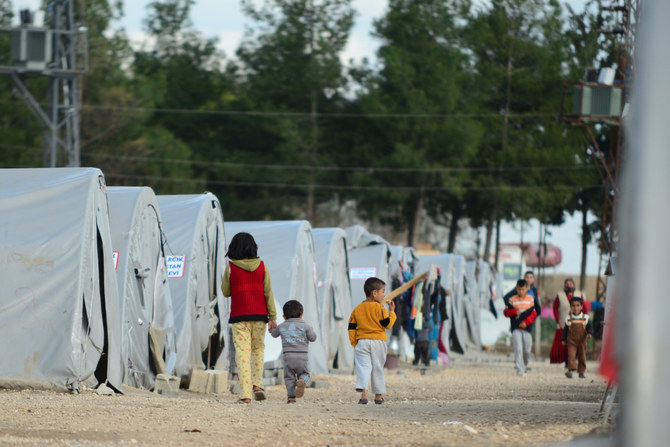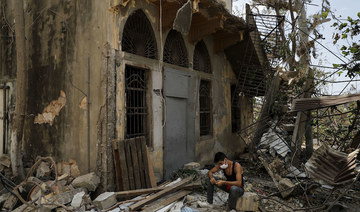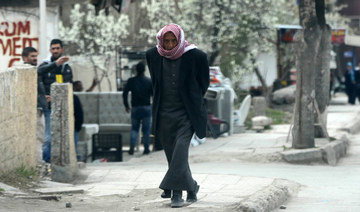NEW YORK: In what might be his final briefing on Syria to the Security Council, the UN’s humanitarian chief on Thursday once again warned of the dire situation in the country, and the terrible toll it is taking on children in particular.
Mark Lowcock, who this month said that after four years in the role he is stepping down to spend more time with his family in the UK, sounded the alarm about a humanitarian crisis which, 10 years into the civil war, is only getting worse. A fragile economy is suffering shock after shock, the currency is in free fall, food prices have spiked by 200 percent, unemployment is rising, and 60 percent of the population lacks access to safe and nutritious food, he said.
Millions are forced to resort to “desperate measures” to survive, he added. Parents are going without food so that they can feed their children, who are having to find work instead of going to school. More than half a million under-fives are affected by stunting, which is impaired growth and development as a result of chronic malnutrition.
Although this crisis is affecting people throughout Syria, it is particularly bad in the northwest and northeast, where Lowcock said one in three children is suffering from the irreversible effects of stunting. He said malnutrition is so common that parents no longer even notice the signs in their children.
“The effects this will have on their development and learning will be lifelong and irreversible,” he added.
Sonia Khush, Save the Children’s Syria response director, told the council that about half of Syrian children are growing up “having known nothing but conflict, which has permeated all aspects of their lives and robbed them of their childhoods.”
She added: “Children today are facing a graver reality than at any other point in the 10-year conflict. They are more likely to be in need of humanitarian assistance, to go hungry, to die from preventable diseases, to miss out on school and face protection risks.”
Khush said the combined effects of the conflict, during which thousands of children have been killed, displacement, poverty and the COVID-19 pandemic have created conditions in which millions of Syrian young people are missing out on an education, girls are being married off to support their families, boys are being sent to war, and child labor is becoming more prevalent.
Schools are supposed to be safe places for children to learn and thrive, she added, but instead they have been attacked, used by armed groups and are littered with unexploded ordinance.
Of the five million people across northern Syria in need of cross-border assistance, two million are children and half of them have been displaced, in some cases more than 10 times, Khush said.
Lack of access to adequate supplies of food and water has resulted in an alarming nutritional crisis.
“This means they have gone for months without eating nutritious food that is vital to their survival and development, and the number of children who go to bed hungry every day is in the millions,” Khush said.
In the past year, the UN has lost access to three of four border crossings through which it delivered humanitarian aid to Syria from neighboring countries. Under pressure from Russia and China, on behalf of the Assad regime, closed crossings have not been reopened. In the northwest, the entire humanitarian aid effort to help 2.4 million people has to pass through a single checkpoint on the border with Turkey.
“Without the cross-border operation, doctors in northwest Syria, like some of those I spoke to, would not be able to provide those children with the care that they need to survive,” Lowcock said. “They would not have the resources and supplies to carry on, within quite a short period of time, they said. The situation would go from terrible to catastrophic.”
Lowcock, who is also the emergency relief coordinator, reiterated the stance of UN Secretary-General Antonio Guterres that “when it comes to delivering life-saving aid to people in need, all channels should be made, and should be kept, available.”
Should the Security Council again fail to extend its authorization for cross-border assistance, Lowcock warned that it would “trigger suffering and loss of life potentially on a very large scale.”
Despite the dire warnings, the Russian stance on the issue of cross-border assistance remained the same.
“There is no doubt that keeping the cross-border mechanism will also mean keeping supporting terrorists, who are living on what they have extorted and also on how they are controlling smuggling,” said Vassily Nebenzya, Russia’s permanent representative to the UN.
“If we all had to make a decision on the extension of the cross-border mechanism tomorrow, I fear that we would not have any convincing grounds to do so.”
























